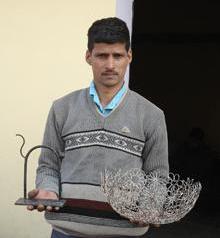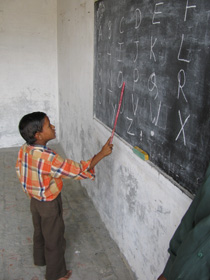These wastebaskets are hand crafted with recycled cloth scraps and wire and make a colorful way to separate paper and other recyclables from trash.
Handmade using recycled materials by artisans in India at Mohd Israil's workshop, one of many fair trade workshops sponsored by Noah’s Ark. Noah’s Ark is an NGO founded in 1986 by Samuel Masih, one of the leaders in the movement to pay fair wages to artisans in India.
- Small Wastebasket measures 9-1/2" high with an 9-1/2" diameter
- Large Wastebasket measures 12" high with an 11" diameter
- Please note no two are the same colors do to being hand made.
Handmade in India and fair trade imported.
Handmade using recycled materials by artisans in India at Mohd Israil's workshop, one of many fair trade workshops sponsored by Noah’s Ark. Noah’s Ark is an NGO founded in 1986 by Samuel Masih, one of the leaders in the movement to pay fair wages to artisans in India.
- Small Wastebasket measures 9-1/2" high with an 9-1/2" diameter
- Large Wastebasket measures 12" high with an 11" diameter
- Please specify assorted bright or assorted dark color preference
Handmade in India and fair trade imported.
Noah's Ark Artisan Story India This item was handmade in India in a workshop sponsored by Noah’s Ark, an NGO that offers funding for raw materials, machines and workshop repairs to 100 artisan groups across India. In exchange for assistance, workshops must prove that all employees are paid fair wages for their products and work in safe and clean conditions. Noah's Ark also offers free classes in capacity building to its network of 600 artisans, a rigorous quality control check, and runs education and water sanitation projects to benefit the artisans’ children and the rest of the community. The company has established 20 new workshops in the past 15 years, and all employees are paid 10-15% above the local rate.
This item was handmade in India in a workshop sponsored by Noah’s Ark, an NGO that offers funding for raw materials, machines and workshop repairs to 100 artisan groups across India. In exchange for assistance, workshops must prove that all employees are paid fair wages for their products and work in safe and clean conditions. Noah's Ark also offers free classes in capacity building to its network of 600 artisans, a rigorous quality control check, and runs education and water sanitation projects to benefit the artisans’ children and the rest of the community. The company has established 20 new workshops in the past 15 years, and all employees are paid 10-15% above the local rate.
Noah’s Ark was founded by Mr. Samuel Masih in 1986 back before anyone was familiar with the concept of “Fair Trade.” A businessman from Moradabad, India, Masih observed his other business associates were taking a personal commission from the local metalworking artisans, on top of paying them very low wages for their work. This led to a distrustful and exploitative work environment, and inspired Masih to create a more collaborative environment based on trust and mutual respect.
After two difficult years, Samuel explained his objectives to Mrs. Sullivan of Sullivan Florist in the United  States, who immediately placed an order for US$ 70,000. This led to collaborations with other international companies, including Tear Fund, Artisanat-SEL, Goed Werk, TEAM and Oxfam Australia. Today, the company produces a US $1.5 million in exports and funds Noah's handicrafts and Welfare society, an artisan association created in 2000 to promote artisan welfare, capacity building, childhood education and social work.
States, who immediately placed an order for US$ 70,000. This led to collaborations with other international companies, including Tear Fund, Artisanat-SEL, Goed Werk, TEAM and Oxfam Australia. Today, the company produces a US $1.5 million in exports and funds Noah's handicrafts and Welfare society, an artisan association created in 2000 to promote artisan welfare, capacity building, childhood education and social work.

